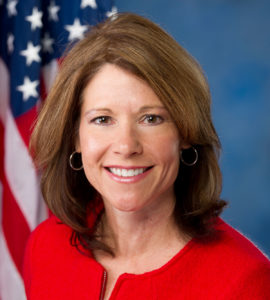 U.S. Representative Cheri Bustos (D-IL) yesterday introduced the Next Generation Fuels Act, legislation that “leverages greater fuel octane to reduce carbon emissions from transportation, improve air quality by reducing the use of harmful aromatics and increase demand for biofuels.”
U.S. Representative Cheri Bustos (D-IL) yesterday introduced the Next Generation Fuels Act, legislation that “leverages greater fuel octane to reduce carbon emissions from transportation, improve air quality by reducing the use of harmful aromatics and increase demand for biofuels.”
Fuels with greater levels of octane are more stable and have the potential to make engines more fuel-efficient. This legislation establishes a minimum octane standard for gasoline and requires sources of the added octane value to reduce carbon emissions by at least 30 percent compared to baseline gasoline. Furthermore, the legislation limits the use of harmful aromatics in meeting this new higher octane standard, as well as in current-market gasoline.
Renewable Fuels Association President and CEO Geoff Cooper said, “By establishing the roadmap for an orderly transition to high-octane, low-carbon fuels, this landmark legislation begins an exciting new era in transportation fuels policy. As the world’s top supplier of clean, affordable, low-carbon octane, the U.S. ethanol industry proudly and enthusiastically supports this legislation.”
RFA notes the bill would establish a certification test fuel with a research octane number (RON) of 98, along with a requirement that the source of the octane boost reduces lifecycle greenhouse gas emissions by an average of at least 30% compared to a 2018 gasoline baseline. The legislation also includes a restriction on the aromatics content of gasoline, ensures parity in the regulation of gasoline volatility (Reid vapor pressure), corrects the “R-factor” used in fuel economy testing, provides for an E30 fuel waiver, replaces EPA’s flawed MOVES model, and restores meaningful credit toward compliance with fuel economy (CAFE) and emissions standards for the production of flex fuel vehicles (FFVs).
The American Coalition for Ethanol (ACE) was one of many organizations that worked on the legislation with the congresswoman’s office but CEO Brian Jennings expressed reservations.
“We appreciate Congresswoman Bustos has introduced legislation designed to remove barriers to higher blends of ethanol and which acknowledges future policy needs to be considered in the framework of GHG emissions,” said Jennings. “While this legislation contains many of our top priorities, its approach to carbon accounting is flawed and undermines the investment many ACE members have made to reduce their carbon intensity.”
“ACE prefers a low carbon fuel policy which assigns each fuel producer an individual carbon intensity score and measures lifecycle GHG emissions to provide credit for farming practices that reduce emissions from fertilizer use and sequester carbon in the soil. Policy with these two components would reward farmers for climate-smart practices and ethanol facilities for making investments to reduce GHG emissions.”

